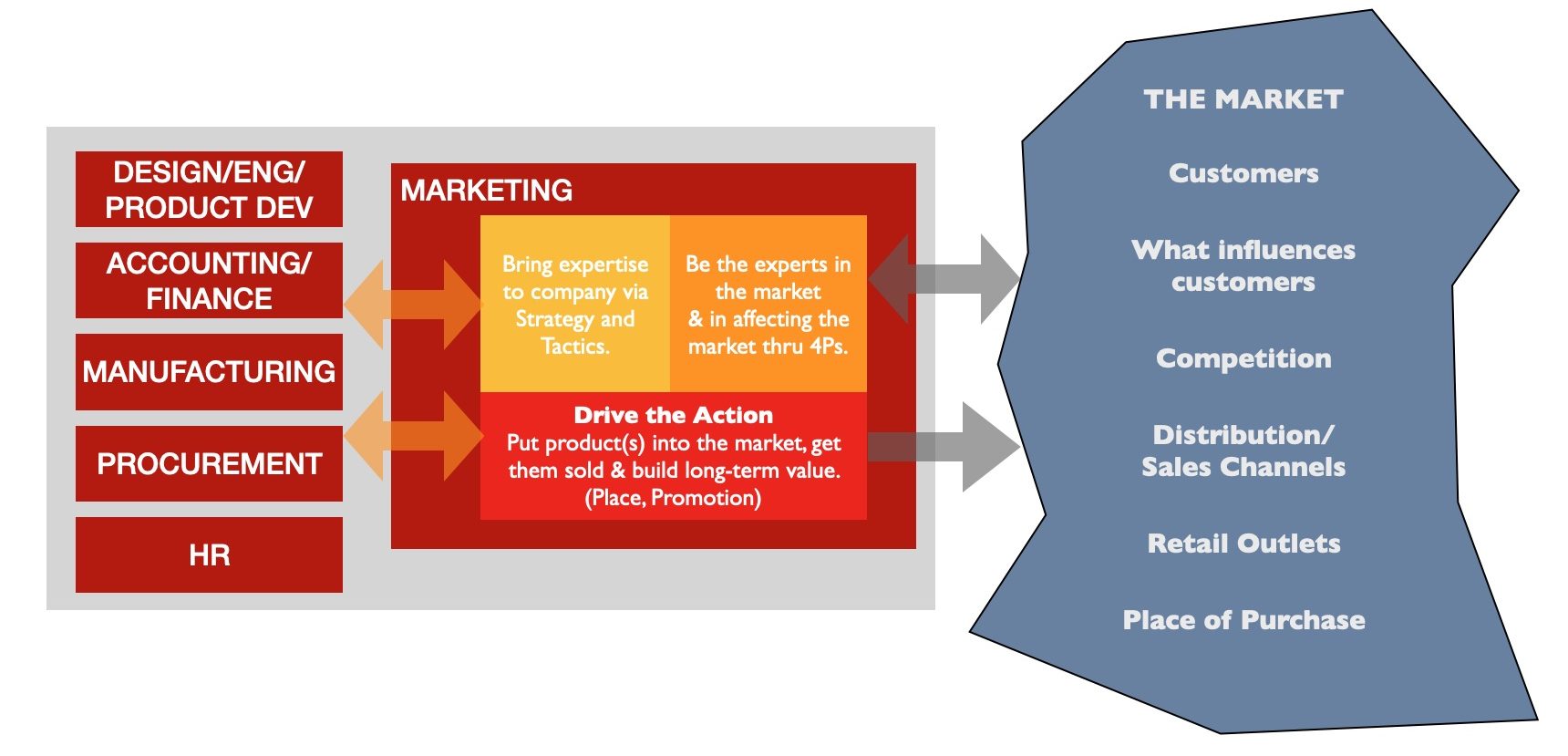
Marketing Roles: The Conflict Between That Which is Important and That Which Companies PERCEIVE as Important

Many boardrooms no longer include a marketer — something we’re told is justified by the odd assertion that “the CMO has nothing important to add to discussions at that level.”
Oh. Except market realities. But I guess those are no longer important to company strategy? Or is it that “anyone” can understand the market without training? Even worse, perhaps the assumption is that financial and consultant reports summarize the market effectively.
I have pondered this strange development at length. The challenge is so widespread that we need to take care to avoid overly simple solutions. And then, in my recent return to the university classroom, I’ve been challenged anew with explaining to business students why Marketing Management is a required class. This post shares some insights into marketing roles which seem to finally offer threads to understand how things arrived at this point.
Separate Marketing’s Role from Its Functions
I have ALWAYS managed within business by focusing on the role of individuals and departments rather than the details of their functions. This has been tremendously freeing because it offers a superb way to understand the value of each area.
Yet as I teach my upper level business classes, I realize the textbooks fail to offer students a vision of marketing’s role. And after one stumbling attempt to use the 4Ps to explain, I realized that while the 4Ps are CRITICAL they explain the functions of marketing — not its role.
So now my teaching and my thinking separate what I see as three fundamental marketing roles from the 4 primary functions expressed in the 4Ps.
Marketing’s Three Roles
 I use this illustration with students and define marketing’s roles as:
I use this illustration with students and define marketing’s roles as:
- To be the experts in the market and the experts in ways profit can be created from the market. In this role, “the market” is far more than tracking some clicks on Amazon. Market includes at least (a) customer, (b) influences on the customer, (c) distribution outlets, (d) communication outlets, (e) the competition and (f) the physical (or virtual) location at which products are bought. Nothing is more critical to a company, whether startup, entrepreneur, or Fortune 100, than building a useful, actionable understanding of the market.
- To bring this expertise into the company and the execution of all roles. In this way, company efforts are aligned to have best impact on the market. Marketers communicate this strategically (with marketing strategies and by influencing the full corporate strategy) and by guiding tactical work. Notice that many activities influenced by marketing necessarily lie in other departments — the marketers aren’t busy doing the work…they’re influencing it.
- To execute specific functions — primarily Placement and Promotion. These are usually seen as the responsibility of marketing from top to bottom. These are also the areas where marketers often look the busiest and where the impact of their work is most clearly understood. (I note below that many companies don’t see Placement as a marketing role but a sales role assuming it’s only about selling in the product. This is a serious strategic mistake.)
What about the 4P’s?
 With the fundamental role of marketing understood, the 4Ps really ARE the best way to consider marketing’s functions. For this reason I demand my students look at every new concept to confirm for me where and how it affects, and is affected by, the 4Ps. Single minded focus on the 4Ps as marketing’s area of action is critical to business success.
With the fundamental role of marketing understood, the 4Ps really ARE the best way to consider marketing’s functions. For this reason I demand my students look at every new concept to confirm for me where and how it affects, and is affected by, the 4Ps. Single minded focus on the 4Ps as marketing’s area of action is critical to business success.
Yet it is important to understand the 4Ps are functional activities and not roles. For example, where does “know the market well” fit in the 4Ps? Everywhere.
And this points to one problem in explaining marketing’s value. When those of us arguing that marketing is being minimized turn and point to the 4Ps, many in the company look at functions and assign them elsewhere.
We also fight a challenge that companies demand an appearance of constant busy-ness. Marketers will only pass the “are you busy enough” smell test in the area of Promotion and Place. As a result the company tends to reject marketing leadership (or even activity) in any of the other functional areas.
Yet the best marketers aren’t always in charge — they work well with others to ensure things get done and done well. Yong Zhao reports an emperor of China suggested it is best to govern without the appearance of governing. A highly effective marketing department must embrace a similar idea when influencing other areas the company.
The Inverted Perception of the Importance of Marketing Roles
From 30 years marketing experience creating and introducing products to the market, it’s incredibly clear that the three roles should be prioritized as follows:
Being experts in the market is our single most critical role. And if we aren’t doing that, companies struggle, stagnate, or fail.
Following that, it’s critical that our expertise impact what the company does by influencing product development and a range of other areas within the company. This includes pricing which MUST be looked at strategically, developed by a cross-functional team led by a marketer, and created to have the best impact in the market.
And, yes, we do the placement and promotion activities which also require a deft touch guided by a deep understanding of the market.
Unfortunately, what I see within companies is the exact opposite idea. We can summarize this as:
Marketing is only communication. We need marketers for that. After all, GaryVee (or some other huckster du jour) says that’s all they need to be and that marketing education is a waste.
Our salesmen and women close the accounts — so it’s all their doing. And as long as an account can be closed, it must be a good idea. So we don’t need marketers involved there at all.
Engineers and designers know how to create products — just leave them alone to do their job. We’ll also just have the finance folks create prices — that way we “know” we won’t lose money (yet they do).
And market experts? It’s all of our jobs to be experts in the market. These marketers waste too much money navel gazing in research anyway.
The result? The CMO is demoted to a senior advertising chief. After all, marketing’s most obvious busy-ness is creating ads, driving social media, etc. So this is the one, single thing that the rest of the company is willing to agree is marketing’s area of responsibility. (That said, I observed one company whose accountant trained CEO decided to take control of TV advertising concepts and production — believing he knew better. The results were disastrous, as you’d expect. Yet I don’t think that the CEO ever came to understand how bad the result was.)
Abandoning Marketing Roles Leaves Companies at the Whims of Accident
There is a long distance from demoting in importance the CMO or any marketers and being able to calculate the impact of that choice. So companies rarely understand what difficulties they reaped by making the change.
Removing the important roles from marketing reduces company success to accident — perhaps only when a product is accidentally a hit or a good ad campaign accidentally takes the market by storm or a new distribution campaign is unexpectedly valuable.
In other words, they’ve reduced their market success to hopes of random occurrences making their numbers move in the market. Unfortunately, in a classic example of bias, companies seem to always believe these accidents are NOT accidents — but intentional results of specific actions. They forget that they’ve usually encountered failure from the same set of actions…and forgetting that decide that they were really smart. (Perhaps why my accountant CEO noted above never came to understand what a mess had been made of the advertising.)
Marketer Experience and Training
I read this morning that many executives believe the market is “everyone’s” responsibility so that isolating marketers to be purely communicators is assumed acceptable. As you can read in a comment on this post, we have Peter Drucker, among others, to thank for this.
Unfortunately, it IS true that everyone in the company needs to be doing something which has an impact on the market. It is NOT true that everyone in the company is responsible for analyzing the market and determining what their impact should be. That’s a ridiculous idea but unfortunately Drucker left behind this impression. The result? When doing the marketing becomes everyone’s job it is, in fact, no ones job.
Why? A company’s products are purchased ONLY by human beings. This means purchasers are irrational and engage in thinking which Rory Sutherland suggests is both “non-sense-ical” (as opposed to nonsense) and uses psycho-logic as opposed to rational logic. This is true whether selling to consumers or selling to business customers.
Human beings are not straightforward to understand within the context of business. That’s why marketers ARE trained in sorting out how to think of these humans and how to determine things which will make the company successful because of, or in spite of, the market’s inherent irrationality.
All this said, I do know that sometimes, by accident, the unusual non-marketer will have the appropriate personality and instincts to make a strong market contribution. I love to see this. But, remember, companies want to be able to reliably search their way forward rather than relying purely on accident. Who can reliably get an understanding of the market sophisticated enough to do this? Marketers. And only marketers.
Engineers Seem to Think They ARE Marketers
Another result of the erroneous idea that marketing is “everyone’s” responsibility comes in design and engineering. Consider the “Jobs to be Done” theory around innovation. It is an engineering focused approach to learning from the market. As a result, it lacks any of the clarity and sophistication needed for true market understanding. So, JTBD is generally quite shallow in it’s result and mis-leads engineers as often as it leads them correctly.
JTBD’s most serious error is seeking to make discovery of, and producing, innovation a safe, predictable process. Innovation which is important cannot be safe and predictable. Neither can marketing.
Also, it’s my experience that most engineers don’t know what they don’t know about marketing. So it’s not surprising that engineers would want customers to be logical. This assumption frees them to pursue only engineering without those bothersome little details that come from customers.
Unfortunately, I’ve worked with new product after new product and, when marketers aren’t involved, find:
…The product does okay in the market, but simple early shifts in understanding would have made the product a rock star.
…Engineers believe the product is a “dramatic innovation” but customers don’t. There is no correlation between a product using innovative tech and it being truly innovative in the market.
…The product fails miserably because it lacks key capabilities critical for the market to care.
…The product fails — it was made because “it could be” not because the market cared. For Example, IoT is an entire category where most products fit this description. The exceptions are mostly only fitness trackers and some home security devices.
Rebuilding Marketing
I admit to exaggerating difficulties here to make the discussion clear. Some companies have superb awareness of marketing’s critical roles. Yet, overall, the past 20 years have seen a massive loss of clarity around marketing’s role. Further, the rise of dime-store social media experts and massive consultancies leaves behind the impression that marketers ARE only communication folks.
I’ve found this error especially disturbing among startups. When a startup says they want to learn about “marketing” they usually only mean “we need someone to run our social media.” Among the many startups I’ve met with, very few understand their market and even fewer have developed products which their market cares about. Startups really DO need to start at the beginning with marketing — not jump in mid-stream by hiring communicators.
Go Forth and Embrace True Marketing
I can’t leave this topic without noting that marketing’s involvement with other roles is one of complexity — a reality where roles are highly interconnected. Without the marketing influence, products regularly fail. Yet companies hate complex situations because we want, somehow, to deconstruct every problem into neat and tidy boxes.
That is a very, very bad idea. Companies must learn to live with the vagaries of complexity to succeed. And marketers do, too. For marketers this means accepting that having an influential role also will mean that much of their impact will be included in the output of other departments.
Yet we CAN improve the role of marketing. It requires clear vision among executives together with a strong CMO. And these executives must give smart marketers support to become experts in the market AND bring that expertise back to the company.
We must also suspend the short-sighted demand for “instant” in order to embrace an approach which satisfies short term needs while building powerful future profits. We must be doing today what will create higher profits in the future, Isn’t that what business SHOULD be about?
©2020 Doug Garnett — All Rights Reserved
Through my company Protonik LLC based in Portland Oregon, I consult with companies on their efforts around new and innovative products. I also explore what marketers should learn from the field of complexity science. An adjunct instructor are Portland State University, my teaching covers marketing, consumer behavior, and advertising. Read more about Protonik’s services and my unusual background (math, aerospace, supercomputers, consumer goods & national TV ads) at www.Protonik.net.
Categories: Business and Strategy, Complexity in Business, consumer marketing, Innovation, marketing, Marketing Research, Retail

Posted: April 27, 2020 07:31
Alan Charlesworth
Posted: April 28, 2020 03:48
Doug Garnett
Posted: April 28, 2020 20:18
Thomas P Elmer
Posted: April 29, 2020 11:16
Alan Charlesworth
Posted: February 23, 2021 13:32
Mats Rönne
Posted: February 23, 2021 23:53
Doug Garnett
Posted: September 20, 2021 17:45
Marketing for Beginners: The Best Articles and Expert Resources A 10-Step Guide to the Best Resources in the Marketing Industry – Career Hub | Duke University